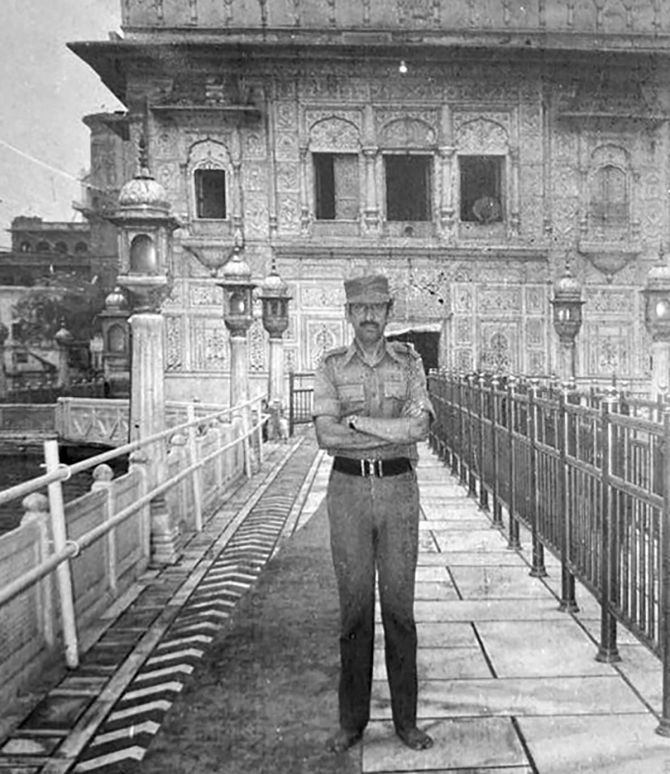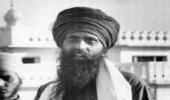'Khalistan would have been in existence today, but for the army.'

As a massive manhunt has been launched to arrest pro-Khalistan radical Amritpal Singh in Punjab, the situation brings back memories of the rise of Jarnail Singh Bhindranwale, the militant who subsequently moved into the Golden Temple with armed terrorists in December 1983.
The Indian Army launched Operation Blue Star six months later to flush out the terrorists.
"We were in a built-up area that extended from the basement to the 2nd-3rd floor. There were rooms after rooms, alleys after alley -- everything was fortified with weapons," recalls retired Brigadier Israr Rahim Khan, commanding officer, 10 Guards, which was the first to enter the Golden Temple.
"We were told to use minimum force and not fire towards the Harmandir Sahib and Akal Takht. We had to take off our army boots and wear rubber canvas shoes. We did whatever we could to maintain the sanctity, but the temple had already been defiled by them (the terrorists)."
The 10 Guards batallion lost 19 men; 53 wounded, some maimed for life. The bullets hit them mostly below the knees because the terrorists were positioned under the staircase and in the basement.
The soldiers tumbled down the stairs, bleeding with bullet injuries. The electricity had been disconnected, there was not even a flicker of light.
"The lives that I lost still haunts me," says the decorated officer in an informative must-read interview with Rediff.com's Archana Masih which serves a caution that we do not repeat that bloody chapter of history again.
- Part 1: 'We had to save India from breaking apart'
- Part 2: '19 dead. 53 wounded. The battle was ferocious'
Every year when June 5 comes near are you reminded of the battle inside the Golden Temple to flush out the terrorists? Do you think of those days?
I think of my men. I was commissioned into the 10th Battalion of the Guards in 1964. I had been with the troops for 20 years. They knew me through and through; my strengths and weaknesses and I knew theirs -- that is the rapport of an infantry battalion.
19 of my 10 Guards men were killed, 54 were wounded -- some maimed for life. The bullets hit them mostly below the knees because the terrorists were positioned under the staircase and in the basement.
The soldiers tumbled down the stairs, bleeding with bullet injuries. The electricity had been disconnected, there was no water and it was night time. One could not make out one hand from the other, there was not even a flicker of light.
I remember the men I lost and the collateral damage that was known would be incurred in the operation.
The lives that I lost still haunts me.
You fought in west Pakistan during the 1971 War against the Pakistan army. Was Operation Blue Star the most difficult military action in your military career?
Yes, most dangerous and most difficult. It was not a set piece attack that we were trained for. The army is trained to fight the enemy and the two listed enemies are Pakistan and China, but here we were in a built-up area that extended from the basement to the 2nd-3rd floors.
There were rooms after rooms, alleys after alleys -- everything was fortified with weapons. I don't think there is any other example of such a fierce battle inside a built-up area by any army of the world.
And you had to complete the operation by morning at any cost, come what may?
We were pitched against time. The temple had to be cleared by morning otherwise the whole of Punjab would have gheraoed and perhaps massacred us.
That is why tanks had to be brought in. It was basically to help the Special Frontier Force and para commandos to finish their task.
The Sikhs are still hurt because their holiest place was attacked by tanks. There is a section of people who nurse these thoughts, but this attack was inevitable.
The instructions of the General Officer Commanding Major General Brar was to use minimum force and not fire towards the Harmandir Sahib and Akal Takht.
We had to take off our army boots and wear rubber canvas shoes. I had to order shoes for my men before the operation.
In view of the sanctity of the holy place, such measures were advisable. We did whatever we could to maintain the holiness, but the temple had already been defiled by them (the terrorists).
There was a full-fledged grenade making factory inside the Golden Temple. The sanctity of the temple had already been destroyed.
Bhindranwale did not move into the Golden Temple [till 1983]. All the other security services were available to the government, but they were unable to tackle the situation. It was only after that that the army was called.
The situation had reached a point of no return.
Khalistan would have been in existence today but for the army.
The history of the nation would have been different. There would have been Khalistan, Pakistan and China. The fate of the country would have been different.
Punjab is still a sensitive state, Khalistan is not dead.

When did your battalion leave the Golden Temple?
We were the first to enter and last to leave. The battle was over on the June 6, there were some remnants on the 7th.
The temple was washed and cleaned.
I was told that 10 Guards would remain inside the temple till the prime minister's visit. The President came on a visit. Indira Gandhi visited on June 23.
I had 600 men inside and we were using the living quarters of the SGPC staff inside. I used to send my men in batches by vehicles to Govindgarh fort to bathe and return.
There was a lot of currency, jewellery and valuables found inside. It had been collected by Bhindranwale and kept in gunny bags.
The army constituted a board of officers to take charge of all the jewellery and count the currency so that it could be deposited in the government treasury. I was presiding officer of that board.
I requested my brigade commander that I had fought a battle, lost men and was still deployed inside. I told him, 'Sir, with due respect, I can't do stocktaking of Bhindranwale's wealth'. This was not my training as a soldier.
The task was given to someone else.
We left on June 23.
What do you remember about Indira Gandhi's visit to the Golden Temple after the Operation?
Indira Gandhi looked very sombre at the sight of the gaping holes in the Akal Takht. The army chief General Arun Vaidya, Lieutenant General Krishnaswamy Sundarji, Major General Brar and many other senior officers were present.
I had Sikh troops and a Guardsman Hari Singh (Sepoys of the Guards battalion are called guardsmen) was dressed in the ceremonial attire. He offered her water saying 'Peelo ji' and that's the only time she smiled.
You have lived under the threat of Khalistani terrorists since the operation, yet your security cover was downgraded last year and reinstated after much back and forth?
The UP government downgraded my security from Y to X category. About the same time a video was released which announced a large bounty on the heads of Lieutenant General Brar, Colonel (Jasbir Singh) Raina and myself.
I went to the police commissioner to inform him. He told me he had recommended that my security should not be reduced. He did not know why it was downgraded and said he would speak to the DGP and revert.
I told him the threat is out there and there is no time. I said I fought the terrorists because I was ordered to do the task. I did it to the best of my ability in the interest of the nation.
I also conveyed it up to the Directorate General of Military Intelligence at Army HQ. They were as loyal as they were to me in service and took it up with the Intelligence Bureau and home ministry.
It took 3-4 months of paperwork and the home ministry ordered the UP government to restore it. It took another 3-4 months for the UP government to restore it to Y category.
I have Y category security now.

When did your family know that you and your battalion were fighting terrorists inside the Golden Temple?
My wife is a doctor and was posted in west Delhi. She thought I was with my unit in Jalandhar and did not know that I was fighting inside the Golden Temple.
She lived in a residential colony of doctors and paramedical staff. One night the head nurse knocked at the door at 10 pm and told her she had seen me on TV. My wife turned the TV set on and saw me.
She was shocked. I met my family much later.
When did you know that you had been awarded the Kirti Chakra?
I came to know through the newspaper on Republic Day in 1985.
It had never even crossed my mind that I would get something in return for what we did. It was about soldiering and loyalty to nation. I motivated my troops in the same manner.
I wrote the citation of 14 from my battalion for gallantry awards. All 14 were accepted and received gallantry medals, some posthumously.
Three among them were Sikhs who laid down their lives for the nation.
Feature Presentation: Aslam Hunani/Rediff.com










